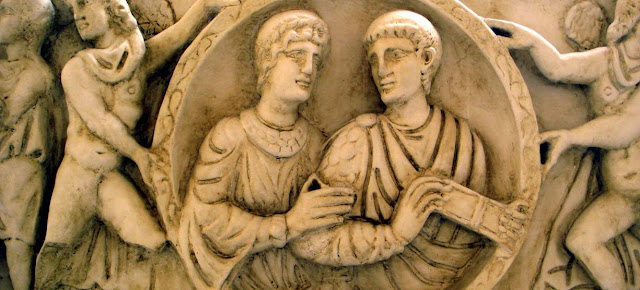- By legitimate birth
Where a father and child were subject to the ius civile and the child had been conceived in lawful wedlock, potestas was created at birth.
- By marriage
The marriage had to be under the civil law. As a result of manus marriage the wife passed into the power of her husband's paterfamilias. In free marriage the wife remained under the potestas of the head of her own family.
- By adoption
In order to prevent a family becoming extinct, Roman Law allowed a person to be admitted into the family of another, as a result of which he was subjected, in certain circumstances, to the potestas of the new paterfamilias.
There were two types of adoption: adrogatio (where the person adopted was sui iuris) and adoptio (where the person adopted was alieni iuris).
+ Adrogatio
Before Justinian. The mode of adrogation was public in character requiring a preliminary investigation by the Pontifex Maximus and the agreement of the Comitia Calata, or later, of the thirty Lictors who represented the curiae in the Comitia Calata. Their consent was not given unless the adrogatus (i.e. the person being adrogated) had a brother who could continue the family worship. Under early law, impubes (boys under 14, girls under 12) could not be adrogated. Antoninus Pius removed this prohibition subject to: a preliminary enquiry; the adrogator giving security for the restoration of the property of the adrogatus to his family on his death; a promise by the adrogator not to emancipate the adrogatus except for a good reason; the right of the adrogatus, if emancipated without just cause, or disinherited, to the restoration of his property, plus one-fourth of the adrogator's estate on the latter's death (the Quarta Antonina).
Under Justinian. Imperial Rescript became the usual method of effecting adrogation. It was necessary to establish that the adrogatus had consented, and that the adrogator had no adopted or natural children, was over 60, and at least 18 years older than the adrogatus.
Effects. The adrogatus and people in his power passed under the potestas of the adrogator. The adrogator's debts were extinguished buy a Praetorian actio utilis allowed a creditor to proceed against the adrogator. The property of the adrogatus passed to the adrogator. (Justinian allowed the adrogator only a usufruct in it.) Obligations of the adrogatus arising from delict remained attached to him.
+ Adoptio
Before Justinian. Under the XII Tables, it was ruled "Should a father sell his son three times, the son becomes freed from the power of his father." Adoption could be effected by a father fictitiously selling his son three times by a process of mancipation, after which his power over the son ended; the child was thus mancipated to a purchaser and, in a fictitious in iure cessio, the magistrate would give the child to the adoptor.
Under Justinian. The earlier forms were abolished and adoption was allowed only by declaration before a magistrate made by the person giving the child, by the adoptor, and the adoptee.
Effects. The adoptee left his original family and entered the family of the adoptor. Justinian allowed this only where the child was adopted by an ascendant –adoptio plena (complete adoption). Where the adoptor was not an ascendant the child stayed in his original family, obtaining a mere right of succession on intestacy to his adoptor, and acquiring the duty (which was reciprocal) of support– adoptio minus plena (incomplete adoption). Descendants of the adoptee did not pass into the potestas of the adoptor.
Note:
There were no restrictions on the adoption of impubes.
Since women did not possess patria potestas, they could not adopt or adrogate. Under the Empire, women who had lost children were allowed to adopt.
- By Imperial Rescript
Where Latins or peregrines were allowed a grant of citizenship by imperial rescript, their children already born were declared to be in their potestas.
- Erroris Causa Probatio (Proof of error)
Where a Roman citizen had married a peregrine woman in the belief that she possessed citizenship, their son would not be a Roman citizen. On giving proof of the error, his son and wife became citizens and the son passed under his father's power.
----------
Source:
Roman Law, L. B. Curzon, pages 34 - 37.
